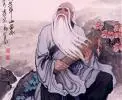The Wisdom of the Dao
Main themes in the Dao De Jing
The Dao De Jing, although it might seem cryptic at first, is not far removed in many of its messages from other philosophies of its time. The need to act according to nature, the understanding of virtue as a skill and the Daoist praise of humility are reminiscent of similar passages in the works of Stoics, Epicureans and Aristotelians. In this article, we walk quickly through the main themes of the Dao De Jing.
This article is part of a series on Daoism and Hermits.
If you like reading about philosophy, here's a free, weekly newsletter with articles just like this one: Send it to me!
Today we want to talk a bit more about that short but seemingly immortal book, the Dao De Jing. Since it was first written, it seems that every society, every generation and every reader has been able to find something of great value in it, even if it seems impossible to agree on what exactly the valuable insights are. The Dao De Jing often seems rather like a funhouse mirror or a Pythian oracle, in which every visitor can find a distorted version of what they are looking for.
This is good for us, because it allows us to have fun creating our own exegesis, and to utilise its wisdom for our everyday lives in the 21st century: a purpose that surely the book’s author did not have in mind when he dictated its 81 paragraphs to the toll collector on that remote Chinese mountain pass over two millennia ago. If nobody really knows what the book’s point is, then our interpretation is as good as anyone else’s.
And so here we go.
The common wisdom of mankind
There’s a remarkable book by polymath, philosopher, celebrated writer and psychonaut Aldous Huxley (1894-1963), The Perennial Philosophy, in which he attempts to show that all the world’s religions have a lot more in common than their differences seem to suggest. I always found that project fascinating. All too often, we are blinded by the small differences between our creeds. Whether the Holy Spirit proceeds from the Father or the Father and the Son seems to be a somewhat minor point, but it has been behind a division of Europe into East and West that has lasted for 1000 years and has shaped the history of mankind up until the present. And this is not even mentioning the only slightly bigger differences between Christianity and Islam or Islam and Judaism, which have been motivating wars, terrorism and mass murders for centuries.
Aldous Huxley’s “The Perennial Philosophy” is a sweeping overview of the world’s religious mystical traditions, emphasising the ideas that are common to humanity’s approach to the divine. It is an easy-to-read and immensely fascinating book.
Amazon affiliate link. If you buy through this link, Daily Philosophy will get a small commission at no cost to you. Thanks!
In order to see how this could work, you just need to visit Malta. A little island-state south of Italy, Malta has always been fiercely Catholic, but its language, coming from Arab Sicily in the 1400s, is now an Arabic dialect, written with a Latin alphabet. Their Catholic God they call Allah, because this is the word for “God” in Arabic, and their Christian churches are called “Houses of Allah,” which provides a wonderful vision of how things could (and probably should) have been, instead of the centuries-long carnage that Christianity and Islam forced onto their believers for no good reason at all.
Anyway, back to the Dao. Reading it, I had a similar experience to reading Huxley’s book. If one reads the Dao with an open mind and with a goal of finding the core of wisdom within it (rather than, say, to provide an academically correct and verifiable, Sinologist-proof translation), it is amazing how similar the book can sound to the perennial classics of Western thought.

The Stoic Dao
One topic that all ancient philosophies talk about is the will or the way of nature, and how human folly can be seen as opposing this natural way things are supposed to be. Of course, human culture by definition is opposed to the ways of nature, and so, the wise would say, is doomed to be foolish, wrong and futile in its aspirations.
This has been true for Epicurus, who was very suspicious of the human project to create a complex human culture, based on hierarchies, ranks, worldly (and mostly material) benefits and dependencies. Epicurus taught that we should learn to live with little, and that the natural pleasures are easier to procure and more satisfactory than the “vain pleasures” of advanced, cultured taste. The Dao says:

Photo by Alexander Schimmeck on Unsplash
Compare this with Epicurus:
Epicurus also emphasises that true happiness does not come from possessing things, but rather from learning to do without them. True freedom is, as Janis Joplin would sing two thousand years after the Greek sage, just another word for nothing left to lose. The Dao De Jing agrees:
(9) It is better to leave a vessel unfilled, than to attempt to carry it when it is full. If you keep feeling a point that has been sharpened, the point cannot long preserve its sharpness. When gold and jade fill the hall, their possessor cannot keep them safe. When wealth and honours lead to arrogancy, this brings its evil on itself. When the work is done, and one’s name is becoming distinguished, to withdraw into obscurity is the way of Heaven.

A comprehensive overview of Epicurus’ philosophy of happiness. Epicurus is one of the few ancient philosophers who are more relevant today than they were in their own times. Learn all about him right here.
The Stoics, too, distinguish sharply between what is natural and what is not. The Stoic person can attempt to act and influence their world, but they can do so only if their actions are in accordance with the laws of nature:
… which sounds quite like an echo of the Dao De Jing:
(63) (The master of it) anticipates things that are difficult while they are easy, and does things that would become great while they are small. All difficult things in the world are sure to arise from a previous state in which they were easy, and all great things from one in which they were small. Therefore the sage, while he never does what is great, is able on that account to accomplish the greatest things.
He who lightly promises is sure to keep but little faith; he who is continually thinking things easy is sure to find them difficult. Therefore the sage sees difficulty even in what seems easy, and so never has any difficulties.
(3) Not to value and employ men of superior ability is the way to keep the people from rivalry among themselves; not to prize articles which are difficult to procure is the way to keep them from becoming thieves; not to show them what is likely to excite their desires is the way to keep their minds from disorder.

A Stoic is an adherent of Stoicism, an ancient Greek and Roman philosophy of life. Stoics thought that, in order to be happy, we must learn to distinguish between what we can control and what we cannot.
Virtue as a skill
For Aristotle, the good life is a matter of skill. One must not only know what the right action is in an abstract, intellectual way. Rather, one must have so much experience of life that one’s right choices feel natural and inevitable. It is only the bad agent, the not-quite wise man, who is tempted to act badly, to do something morally wrong. The wise man, as a result of long conditioning, will spontaneously and automatically make the right choices and thereby benefit themselves and others.
The Dao De Jing has this to say:
(27) The skilful traveller leaves no traces of his wheels or footsteps; the skilful speaker says nothing that can be found fault with or blamed; the skilful reckoner uses no tallies; the skilful closer needs no bolts or bars, while to open what he has shut will be impossible; the skilful binder uses no strings or knots, while to unloose what he has bound will be impossible.
In the same way the sage is always skilful at saving men, and so he does not cast away any man; he is always skilful at saving things, and so he does not cast away anything. This is called ‘Hiding the light of his procedure.’
Striving to act right is, in Aristotle’s view, a sign that one has not yet achieved moral perfection. In the same way, striving to write a word correctly and consciously labouring over one’s orthography shows that the speaker is not yet sufficiently practised in the use of language. Putting effort into hitting the right keys on the piano is the sure sign of the beginner piano player. The expert, seasoned in writing, playing the piano, or controlling their emotions and urges, is above consciously trying. Their actions are not directed by strenuous effort, but show a lightness, a playfulness and a natural, perfect fit with the situation that is the mark of the true expert. Not-trying is what distinguishes the true master. Dao De Jing:
(63) (It is the way of the Dao) to act without (thinking of) acting; to conduct affairs without (feeling the) trouble of them; to taste without discerning any flavour; to consider what is small as great, and a few as many; and to recompense injury with kindness.

Aristotle’s theory of happiness rests on three concepts: (1) the virtues; (2) phronesis or practical wisdom; and (3) eudaimonia or flourishing.
True masters don’t show off
From Baby Jesus in the Bible, through the hidden masters of the Freemasons to Gandalf in the Lord of the Rings and Yoda in Star Wars, we find the motif of the inconspicuous master, the powerful mage, wise man or God, who looks deceptively weak and powerless, yet embodies the divine forces of the universe in their purest form.
The Dao De Jing, too, emphasises the humility of the true master:
(24) He who stands on his tiptoes does not stand firm; he who stretches his legs does not walk (easily). (So), he who displays himself does not shine; he who asserts his own views is not distinguished; he who vaunts himself does not find his merit acknowledged; he who is self-conceited has no superiority allowed to him. … Hence those who pursue (the course) of the Dao do not adopt and allow [these attitudes].
(22) Therefore the sage holds in his embrace the one thing (of humility), and manifests it to all the world. He is free from self-display, and therefore he shines; from self-assertion, and therefore he is distinguished; from self-boasting, and therefore his merit is acknowledged; from self-complacency, and therefore he acquires superiority. It is because he is thus free from striving that therefore no one in the world is able to strive with him.

In its poetic use of opposites, this passage is reminiscent of the Sermon on the Mount (Matthew 5-7):
And he opened his mouth and taught them, saying:
3 “Blessed are the poor in spirit, for theirs is the kingdom of heaven.
4 “Blessed are those who mourn, for they shall be comforted.
5 “Blessed are the meek, for they shall inherit the earth.
6 “Blessed are those who hunger and thirst for righteousness, for they shall be satisfied.
7 “Blessed are the merciful, for they shall receive mercy.
8 “Blessed are the pure in heart, for they shall see God.
9 “Blessed are the peacemakers, for they shall be called sons[a] of God.
10 “Blessed are those who are persecuted for righteousness' sake, for theirs is the kingdom of heaven.
The Dao De Jing goes one step further and recommends this approach not only as a genuine attitude towards the world, but, it would seem, also as a strategic move that is likely to bring about desirable results:
(66) That whereby the rivers and seas are able to receive the homage and tribute of all the valley streams, is their skill in being lower than they; – it is thus that they are the kings of them all.
So it is that the sage (ruler), wishing to be above men, puts himself by his words below them, and, wishing to be before them, places his person behind them.
In this way though he has his place above them, men do not feel his weight, nor though he has his place before them, do they feel it an injury to them. Therefore all in the world delight to exalt him and do not weary of him. Because he does not strive, no one finds it possible to strive with him.
This sounds a bit more sinister, but this might also be the fault of the translation. In any case, it poses the question (that is also inherent in Jesus’ words): if I adopt an attitude of humility in order to gain the promised results, does this then still count as genuine humility? Can one strive to look inconsequential in order to trick others into “exalting him”?

Will this work as a trick, and, more importantly, how are we to distinguish genuine humility and wisdom from the humility that is adopted as a mere means to the end of being recognised as a sage?

The Dao De Jing, literally “The Classic of the Way and the Virtue,” is traditionally attributed to an author known only as Lao Zi, which means “Old Master.”
Dao and knowledge
The Dao De Jing is often surprisingly anti-intellectual, which probably is what endeared it to so many Western anti-intellectual intellectuals like Henry Miller. It does not only again and again express a deep distrust of words and the display of knowledge:
This is almost Socratic in its praise of intellectual humility, and one wishes that it was written at the entrance of every university on the planet. And just like the Ancient Greeks knew the danger that comes from the words of demagogues and Sophists, so did their contemporary Chinese:
Things become a bit more difficult when the author seemingly recommends keeping the population uneducated:
(65) The ancients who showed their skill in practising the Dao did so, not to enlighten the people, but rather to make them simple and ignorant.
The difficulty in governing the people arises from their having much knowledge. He who (tries to) govern a state by his wisdom is a scourge to it; while he who does not (try to) do so is a blessing.
Having experienced the reign of Trump and knowing of others like him over the millennia that passed since the Dao De Jing was composed, and having seen the devastating effects of Internet stupidity on public discourse, one will find it hard to praise ignorance with the naive enthusiasm that Laozi seems to show here. Is a population of simple and ignorant people really a good thing? Was the Enlightenment a step in the wrong direction? Or even the invention of the printing press?

I always found it difficult to accept these passages. I know that some of those reading here are actual experts on Daoism, so if you know how we can make better sense of these statements, please help us down in the comments (or, even better, send in your own article on the Dao).
And then, Laozi seems to praise states like 1970s Albania or today’s North Korea:
(80) In a little state with a small population, I would so order it, that, though there were individuals with the abilities of ten or a hundred men, there should be no employment of them …
Though [people] had boats and carriages, they should have no occasion to ride in them; though they had buff coats and sharp weapons, they should have no occasion to don or use them.
I would make the people return to the use of knotted cords (instead of the written characters).
They should think their (coarse) food sweet; their (plain) clothes beautiful; their (poor) dwellings places of rest; and their common (simple) ways sources of enjoyment.
There should be a neighbouring state within sight, and the voices of the fowls and dogs should be heard all the way from it to us, but I would make the people to old age, even to death, not have any intercourse with it.

Photo by Yogendra Singh on Unsplash
It is very unclear to me what the Dao De Jing is saying here, but again, this might also be James Legge’s fault. A population should ignore its gifted members, should stay ignorant and not learn to read and write, should not use technology and not trade with neighbouring states? This doesn’t seem to make much sense. Not only is it a questionable ideal, it is also entirely impossible to practice, since most states, especially “little” ones, cannot be fully self-sufficient.
Since ancient times, human civilisation has been both defined and advanced by trade and the exchange of goods and ideas across countries and boundaries. It is a mystery to me why Laozi would think that returning to small, isolated states with no availability of material goods, no education and no exchange with others would be a good idea.
Your ad-blocker ate the form? Just click here to subscribe!
The Way of water

And finally, we have the water. The Dao De Jing, and many Daoists and other sages of later times, have praised the humble water for its power to change landscapes, to wear down stone and to provide the basis for life. Water exhibits many of the traits that the Dao De Jing wants to see in a sage: it is humble, it flows to the lowest point in a landscape, but despite its softness and adaptability it can unleash enormous power over time, making it into a fit symbol of the power of the Way:
(8) The highest excellence is like (that of) water. The excellence of water appears in its benefiting all things, and in its occupying, without striving (to the contrary), the low place which all men dislike. Hence (its way) is near to (that of) the Dao.
(43) The softest thing in the world dashes against and overcomes the hardest; that which has no (substantial) existence enters where there is no crevice. I know hereby what advantage belongs to doing nothing (with a purpose).
There are few in the world who attain to the teaching without words, and the advantage arising from non-action.
(76) … he who (relies on) the strength of his forces does not conquer; and a tree which is strong will fill the out-stretched arms, (and thereby invites the feller.) Therefore the place of what is firm and strong is below, and that of what is soft and weak is above.
(78) There is nothing in the world more soft and weak than water, and yet for attacking things that are firm and strong there is nothing that can take precedence of it; — for there is nothing (so effectual) for which it can be changed.
Every one in the world knows that the soft overcomes the hard, and the weak the strong, but no one is able to carry it out in practice.

Photo by Carson Vara on Unsplash
Sure, there’s something cool and meme-able about the softness of the water eating away at the stone. What the sage does not tell us is that it’s not the water itself that causes that miracle: it’s the gravity that pulls the water down and that gives it that magical momentum that can wear down the rocks. And here the metaphor breaks. For if the sage is like the water, what is there to play the role of the forces of gravity, to channel and direct the sage’s softness in the service of a long term goal?

And another thing the Dao De Jing keeps silent about: yes, water does wear down the stone, but it takes thousands of years to do so. The Dao might win over brute force, but if it takes thousands of years to win, what good is it to anyone? If you want to remove a rock that’s blocking the entrance to your house and you don’t have thousands of years to wait, you won’t attack that rock with the gardening hose. You’ll use an excavator or at least a big, solid hammer and, in an entirely unenlightened way, smash the thing to bits.
◊ ◊ ◊
Thanks for reading! Photo by Amy Earl on Unsplash.






